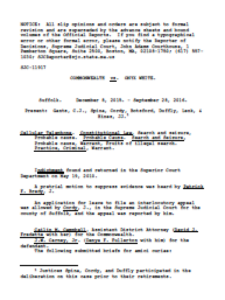Mass SJC Issues Ruling on Cell Phone Seizure
Blog – Cyberlaw Clinic 2016-09-30
 The Massachusetts Supreme Judicial Court this week issued its decision in Commonwealth v. White, SJC–1197 (Sept 28, 2016). The case concerned the circumstances in which law enforcement officers may seize a cell phone to advance a criminal investigation. The SJC held that probable cause to seize a phone “may not be based solely on an officer’s opinion that the device is likely to contain evidence of the crime under investigation.” The Court also ruled that the Commonwealth had not met the burden of demonstrating that the delay between seizure of the phone and application for a search warrant — a delay of sixty-eight days — was reasonable.
The Massachusetts Supreme Judicial Court this week issued its decision in Commonwealth v. White, SJC–1197 (Sept 28, 2016). The case concerned the circumstances in which law enforcement officers may seize a cell phone to advance a criminal investigation. The SJC held that probable cause to seize a phone “may not be based solely on an officer’s opinion that the device is likely to contain evidence of the crime under investigation.” The Court also ruled that the Commonwealth had not met the burden of demonstrating that the delay between seizure of the phone and application for a search warrant — a delay of sixty-eight days — was reasonable.
The case involved allegations that the defendant in question had participated with others in the commission of a crime. In seizing defendant’s cell phone, the SJC noted, detectives did not rely on “information establishing the existence of particularized evidence likely to be found” on that phone. Rather, they based their seizure on the “commonsense notion” that cell phones are necessary to social interactions and an inference that “if the defendant planned and committed multiple crimes with two coventurers, it was likely he did so, at least in part, using his cellular telephone . . . .”
The SJC rejected this line of argument, noting the breadth of the Commonwealth’s position and opining that it would effectively mean probable cause to support cell phone seizure existed in virtually all criminal cases:
In essence, the Commonwealth is suggesting that there exists a nexus between a suspect’s criminal acts and his or her cellular telephone whenever there is probable cause that the suspect was involved in an offense, accompanied by an officer’s averment that, given the type of crime under investigation, the device likely would contain evidence. If this were sufficient, however, it would be a rare case where probable cause to charge someone with a crime would not open the person’s cellular telephone to seizure and subsequent search.
White is the third case in recent years in which Massachusetts’s highest court sought the input of amici to help clarify when law enforcement may glean information from a cell phone to advance a criminal investigation. The Cyberlaw Clinic filed an amicus brief in the case, on behalf of the American Civil Liberties Union of Massachusetts (ACLUM). As set forth in the brief, ACLUM argued that the ubiquity of cell phones, their powerful functionality, and their capacity to store enormous amounts of private information are reasons that they merit the very strongest privacy protections as enshrined in the Bill of Rights and the Massachusetts Declaration of Rights.